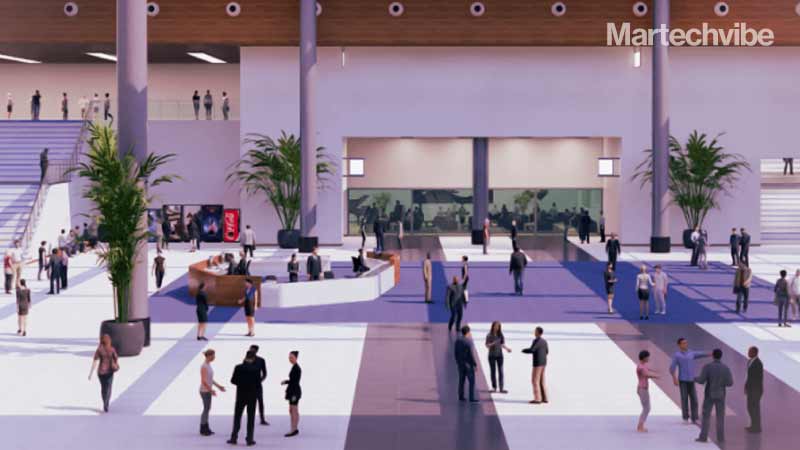A Guide to Organising Engaging Hybrid Events
vFairs released their State of Hybrid Events 2021 Report which delves into key challenges and actionable takeaways that event professionals can apply to their hybrid event programs. The new report outlines the current state of the industry, outlooks for 2022, and addresses common pain points identified by event professionals across 15 industries. It uses proprietary […]
Topics

vFairs released their State of Hybrid Events 2021 Report which delves into key challenges and actionable takeaways that event professionals can apply to their hybrid event programs.
The new report outlines the current state of the industry, outlooks for 2022, and addresses common pain points identified by event professionals across 15 industries.
It uses proprietary data from a vFairs survey conducted over the past quarter. It features responses from event professionals across 15 industries including representatives from corporate marketing and human resources teams, educational institutions, agencies, government and non-profit organisations. Respondents also span a wide range of seniority levels from entry-level jobs to C-level decision makers. A
Hybrid events are top of mind for event professionals going into 2022. Over the past year, there has been a widespread feeling of uncertainty for when and how hybrid events may commence. While some of this is due to uncertainty over both local and global COVID-19 restrictions, some of this is also due to the fact that hybrid events are new terrain for many event planners.
Key statistics
As the report found, 57.4 per cent of professionals believe hybrid events will dominate the future. However, 55.6 per cent of the same respondents noted that they’d like to run a few hybrid events to test them out before diving in completely.
- 41.5 per cent of respondents want easy integration between the live show and other applications
- 15.1 per cent of respondents want a wide span of networking features in their platforms
- 18.9 per cent of respondents look for lifelike virtual events.
Hybrid events are physical events that are also hosted online. In this way, participants in the vicinity of the event venue have the freedom to attend the event in person while those from afar can simply tune in online. Both audiences can interact with the speakers and contribute to the events. Moreover, by adding a virtual element to the event, event hosts don’t have to restrict themselves to an event cap. They can theoretically host a limitless number of attendees from anywhere around the world, at a fraction of the cost of a massive physical event.
Get a hybrid events platform
A hybrid event platform is a technology offering that enables event organisers to take their live in-person events online and host a limitless audience. It’s software that hosts the virtual event and integrates it with in-person activities. Such a solution takes care of broadcasting in-person sessions online, providing networking opportunities over the internet, hosting event documents and videos, and starting engaging online conversations.
Virtual lobby
Online attendees are always at a disadvantage of missing out on the complete event experience. But immersive virtual environments do a great job of mimicking that experience. A virtual lobby welcomes online attendees to a realistic environment so they can feel as though they’ve arrived at a new place. All the while without having to move from that couch in their lounge. These virtual lobbies are often customisable. They’re also easy to navigate as they mimic actual lobbies with demarcated rooms and halls. In addition to this, it’s important to have diverse avatars walking around the space to make for a more inclusive setup.
Virtual auditorium
Similar to a virtual lobby, a virtual auditorium also aims to mimic in-person events. It helps the host showcase all the same presentations shown to in-person audiences. Hosts can also use this to show entirely different sessions to the online audience. Once the sessions conclude, the virtual auditorium also lets attendees view replays of the content.
Virtual exhibit hall
Exhibit halls are a staple for tradeshows and exhibitions. Sponsors and event partners will promote their services at their designated booths. A virtual exhibit hall offers attendees a way to virtually walk through the floor, browse through exhibitors, and connect with those of interest. At hybrid events, exhibitors can have booths on-site, on the virtual platform, or at both venues. This helps event hosts and exhibitors decide what they’re most comfortable with. A booth exhibiting both online and offline is able to multiply its reach many folds.
Also Read: Behavioural Economists To Watch Out For
More sponsorship opportunities
With an online venue added to the agenda, event hosts can offer tons of different sponsorship opportunities to their sponsors. Here are a few examples:
- The virtual exhibit hall can accommodate more exhibitors than a venue with limited space.
- There’s a video vault and resources section to promote services and marketing collateral.
- The lobby, auditorium, and networking lounge, all have spaces for ad placements. Event hosts can promote both their own brand and partner brands here.
- Games like scavenger hunts enable organisers to send more traffic to top-tier sponsors.
- Landing pages and emails can also be used to link up partner pages.
Also Read: Hybrid Cloud Offers Better Data Opportunities for Marketers
Networking and engagement
A lot of event-goers perceive virtual events to be unengaging. But hybrid event platforms aim to enhance the event experience, both online and offline. That’s why they go the extra mile to make lots of networking options available, making it easier to connect digitally. The networking options now popularly available are: In addition to this, there are also a bunch of interactivity features that make attendees feel more involved and engaged. Some popular examples include:
- Chat: instant messaging between attendees, booth reps, and even speakers.
- Audio/video calls: conventional audio or video calls for a more engaging experience.
- Auto-matchmaking: auto-paired conversations between people with similar interests.
- Group networking: group chats, audio calls, or video calls in a group of choice.
- Webinars: speaker sessions that can be live, semi-live, or pre-recorded.
- Live Q&A and polls: the ability to ask questions and vote on polls to interact with the speaker in real-time.
- Social walls: event widget that sources all social media content related to an event in one place to boost excitement.
- Photobooth: like a conventional photobooth, attendees can take pictures, create GIFs, and add to the photo gallery.
- Games: lots of options, varying from scavenger hunts, Kahoot!, spin the wheel, and more.
Hybrid events are gaining momentum. 73.1 per cent of all event professionals are looking to host at least one hybrid event in 2021, while 23.1 per cent want to host over five hybrid events for the same year. Hybrid events offer convenience and cost savings to both attendees and event hosts. They also offer more sponsorship opportunities. With all event stakeholders benefiting, hybrid events are being touted as the new normal for events in the post-COVID era.









































































































